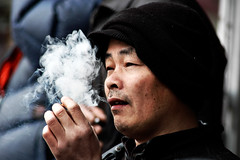
I had the pleasure of catching afrobeat star Femi Kuti in concert this week at the Highline Ballroom in New York. He's on tour with his Positive Force band to promote their new album Africa for Africa.
Femi is the son of Fela Anikulapo-Kuti, the legendary musical pioneer and political activist who stirred up Nigeria in the 1970s and 80s. Fela's music embodies the universal struggle for rights, recognition, and an end to corruption. His lyrics are fiery even when his grooves remain mellow, blending psychedelic rock with James Brown, jazz, and West African high life.
Fela's songs confront the ills he observed in Nigerian society under repressive regimes: Political conformity is ridiculed in "Zombie" and "Mister Follow Follow," peace and resources run through "Water No Get Enemy," and the spirit of resistance animates "No Agreement."
Femi upholds a lot of his father's legacy—he leads the band from behind a Hammond organ and he solos on sax and trumpet when he isn't roaming with the microphone, delivering sweet songs as well as political lectures. What really sets Femi apart from his father is the more muscular, aggressive sound he has cultivated. His compositions blare with tight, punchy horns, and crisp drumming. The tempos are mostly up, breaking only rarely into an island lilt. Femi's body vibrates with the extra energy he couldn't cram into his songs, and even his audience banter hits like a confident staccato hammer of pidgin and English.
Femi also picks up his father's political messages, which continue to resonate in Nigeria some 14 years since Fela died from AIDS complications. The demands in "E No Good" are simple: electricity, drinkable water, housing, good health care, and good pay for doctors, teachers, and police. The afflictions are laid out in equally clear terms: corruption, lies, and inequality.
"Dem Bobo" [They Misinform]
So we struggle suffer dey [here]
For this new democratic change
But the truth of the matter be say
Dem disguise another way
To continue their crooked ways
Oh yes, dem bobo
"It Don't Mean"
When you are walking down the street
Or feeling cool in your brand new Lexus jeep
Because you got money, you feeling rich
Don't mean that the poverty does not exist
As a musician who has toured, Femi sees the pattern across Africa, the same problems and same pains in different countries, as well as the luxuries like social security considered common in rich countries. Generals oscillate with presidents yet the suffering and mago mago [illegal deals] remain. Goons are interchangeable.
"Africa for Africa"
Brothers and sisters
Our countries are colonial structures
Borderlines to keep us forever separated
We must love Africa
We must care for Africa
War and conflicts will only bring suffering and hunger
African leaders must bring us together
All these songs lean more to the descriptive than the prescriptive, which is often where the artist must pass the baton. So what are the good solutions? Can countries shed "Bad Government" without shedding blood as in Northern Africa?
Femi drew a diverse crowd here in New York, with the peoples of no particular continent dominating the mix. This testifies both to the universal power of music and to the potential of cities and democracies to help people live in harmony.
Neuroscientists have discovered that brain cells fire at the exact frequencies our ears hear. What better evidence could exist that reason will eventually prevail over the petty rivalries that divide us? The vibrations outside our bodies are matched in abstract purity inside our minds, and thus shared alike from mind to mind. Pair this with an inspiring message and the people become an unstoppable positive force.
Musicians have a serious responsibility when choosing the tones and stories with which to fill their listeners. Femi Kuti honors this sacred duty, and the legacy of his father, by building a musical shrine for free spirits.







